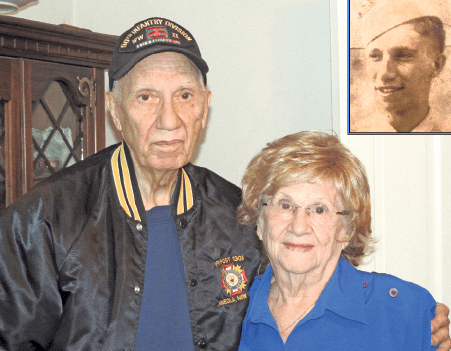
Nearly 70 years after surviving the D-Day invasion of Europe, U.S. Army veteran Thomas Scardino has accepted a new posting, as the commander of Adolph Block VFW Post 1305 in Mineola.
Scardino joined the VFW post three years ago after discovering a comrade, Ray Vaz, who served in the same 90th Infantry Division as he did, was one of his Mineola neighbors.
Both men had landed in the same amphibious assault wave on June 6, 1944, at Utah Beach on the Normandy coast, and a close friendship was formed. Vaz was a member of the VFW post and sponsored Scardino for membership. Scardino, a resident of Mineola for 37 years, also transferred from the American Legion post in Williston Park to join Post 349 in Mineola, where he is now vice commander.
“From that time on, we’ve been inseparable,” Scardino said. “It was like finding a brother.”
Scardino, 88, volunteered to be the VFW commander on a temporary basis this summer when former post commander Manny Grilo moved to Gettysburg, Pa. from Mineola. Last month, Scardino accepted the position on a permanent basis.
Scardino already had been visiting veterans in the Veterans Affairs hospital in Northport for the past 15 years. His new position with the VFW post gives him more of an opportunity to reach out to other veterans and inform them about government benefits that are due them for their service.
“It’s therapy as far as I’m concerned. It takes my mind off any physical problems and my thoughts about the war,” he said.
Scardino’s thoughts about the war are never too far away.
He said he remembers the carnage he witnessed on Utah Beach and could only watch the first 15 minutes of “Saving Private Ryan,” which depicted that scene. He remembers the silence among his fellow soldiers in the landing craft approaching the beach, and the uneasy feeling he had, he said.
“You had the feeling you’re not coming back, but you don’t know what you’re coming into,” Scardino recalled.
What he witnessed after the landing craft ramp hit the sand is something he said he cannot forget.
“I still see it today. It was like a Chicago slaughterhouse, with bodies all over the place, heads, blood in the water.
What a waste,” he recalled. “All you did was follow the guy in front of you, as long as he didn’t hit a mine.”
One month into the Normandy campaign, Scardino was wounded, struck by machine gun fire in the right arm and hand. He was taken to a farmhouse that had been set up as a medical aid station where his wounds were treated. He remembers lying there for six hours, as a German counterattack eventually destroyed the farmhouse.
“We got bombed. The house caved in and I was wounded again,” Scardino recalled.
He had been struck by shrapnel in his right thigh and elbow. He passed out and his next conscious memory was riding in a jeep, lying naked in a stretcher.
“That’s when I knew it was over,” he said.
Scardino ultimately earned two Purple Hearts and a Bronze Star for his World War II service – medals that he received in 2008 through Rep. Carolyn McCarthy’s office. He recently suggested his friend Ray Vaz also contact McCarthy, and that provided the impetus for Vaz receiving his medals.
Scardino spent four months convalescing in England, then returned to the U.S. and spent the remainder of the war in a desk job at an Army office in Maryland.
That’s where he met Frederick Ioli, who eventually introduced Scardino to Ioli’s sister, Flora, who would become his wife. He and Flora have been married 66 years, have six children, 13 grandchildren and three great-grandchildren.
Her family’s story is a real-life “Saving Private Ryan” saga. All four of her older brothers enlisted in the Army.
Shortly after the D-Day invasion, one had died of wounds suffered in combat, one was missing in action – and was ultimately never found – and a third was a prisoner of war.
Her brother Freddie was somewhere in Europe, and Flora, then 15, wrote a letter to President Franklin Roosevelt complaining about the inequity of her family’s situation. She said she subsequently received a letter from Roosevelt assuring her that her brother was coming home, and soon after he did come home.
Scardino spent a career in the garment industry running his own factory after the war. And then, largely due to his rehabilitation, embarked on a new career as a professional bowler.
When he returned to the states after his recuperation in England, he spent time rehabilitating in Virginia. Much of that time was spent in a Norfolk, Va. bowling alley throwing lightweight baleens – target balls used in bocce. He graduated to regulation bowling balls as his arm strength improved and he became adept at throwing strikes.
He got so good that between 1963 and 1967, while still in the garment business, Scardino went on the Professional Bowlers Association tour with luminaries such as Don Carter, Dick Webber and Lou Campi.
“I didn’t make big money,” he said, but he enjoyed competing. His days on the tour ended because of problems with his legs.
Looking back, he said, his faith tells him that surviving the war after being so severely wounded was no coincidence. He said he thinks his late mother, Giovanna, who died at age 26 when he was seven years old, was looking out for him.
“I was blessed. From that day on, I stole 70 years. Every day to me is a blessing,” Scardino said. “I think of my mother. That was my angel and it wasn’t my time.”






